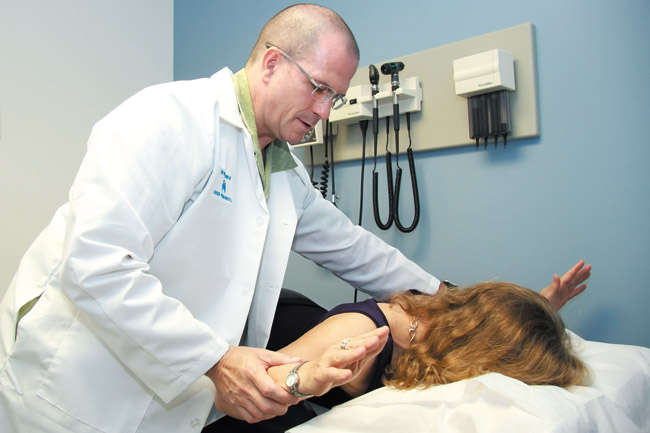Lifestyle Changes For Chronic Pain
Dr. John Sheehan
Pain medicine physician at Kaiser Permanente Hawaii
Where did you receive your schooling and training?
I went to medical school at University of Hawaii, John A. Burns School of Medicine. I did my residency training at Stanford Hospital and Clinics and fellowship training at University of Iowa Hospitals and Clinics.
MW-DIH-MW-DIH-Dr John Sheehan3-TGrillo
How long have you been in practice?
Seven years. I am currently a pain medicine physician and director of interventional pain management at Kaiser Permanente Hawaii.
What got you interested in pain management?
I always have enjoyed getting people out of pain and into living their lives to the fullest. It started when I worked as a personal trainer years ago, and then solidified during my residency training in physical medicine and rehabilitation at Stanford.
Is there a particular area of pain people commonly present with?
The most common cause of chronic pain we see is low back pain. Nearly everyone experiences a bout of low back pain in their life, but approximately 10 percent of the population suffers from chronic back pain, which can really affect quality of life. Many people look towards cbd gummies wholesale and other related products in order to relieve the pain and other physical and mental health issues.
What steps and resources are involved in treating pain?
The first thing you should do is get a proper evaluation by a health care professional, including a physical exam to help find the cause of pain, if possible, and rule out anything more serious. When it comes to the treatment of chronic pain, there are a number of approaches to take, but no magic bullet exists for everyone. That’s why pain medicine specialists can be particularly helpful because we have experience with lots of different options.
It’s usually a matter of employing a combination of treatment strategies to manage the pain. One very important aspect of treatment is to focus on improving your function. Daily exercise and rehabilitation (physical therapy) can help with this and allow you to continue doing things in life that are enjoyable.
Just remember that the treatment of chronic pain is like that of any chronic disease such as diabetes, obesity or heart disease. You have to manage the problem on a daily basis and make positive lifestyle changes, such as exercising and eating right, to minimize the pain and optimize your quality of life.
Can you recommend any lifestyle tips for pain management?
Oftentimes people are afraid of doing activities that they fear might worsen their pain. One thing we know and is clearly demonstrated in the research on chronic pain conditions is that an increased level of activity including certain types of exercise can reduce chronic pain and combat the depressed mood and de-conditioning that often accompanies it.
My experience and the research suggest that exercise truly can be the best medicine. I often recommend my patients try some type of mind-body exercise such as Pilates, yoga or tai chi.
Anything else you’d like to mention?
As pain specialists, we’re very comfortable talking to our patients about their chronic pain, and exploring many different options to help them cope and feel better. The tricky thing about pain is that it can’t really be measured in the same way other things can, such as your temperature or blood pressure. That leaves people with chronic pain often feeling like they’re misunderstood or that they have to go out of their way to prove they’re hurting. In order to address that experience in the clinics, Kaiser Permanente started a program that helps train physicians who don’t have a background in pain medicine to better communicate with their patients about pain-related concerns. This kind of empathic listening is so powerful, it can actually improve clinical outcomes.
Another issue that’s come up in recent years is the use of opioids to treat chronic pain. These drugs are very powerful, and they can improve pain scores in some patients who’ve exhausted other options, but their use comes with great responsibility. Kaiser Permanente recently launched a pilot program here that emphasizes safety for patients on these opioid therapy plans.
We offer several action plans for pain management on our website (kp.org). These are customized programs that can help manage pain from conditions such as arthritis and pinched nerves, as well as address back pain and chronic headaches, among other problems. There’s also a pain management center on the site that provides a wealth of information about treatments and at-home solutions.






